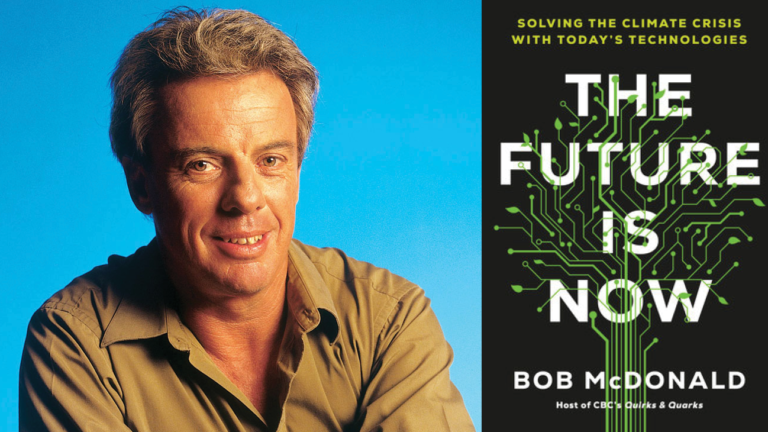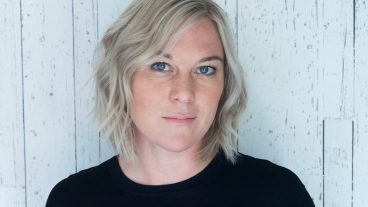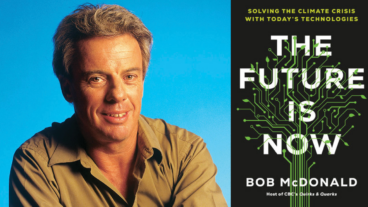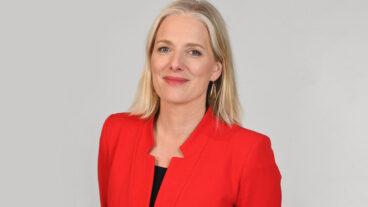As the host of CBC’s Quirks & Quarks, Bob McDonald is one of Canada’s best-known science journalists. His bestselling books have brought us on a journey through the wonders of science and space travel, and now, with the release of his most recent book, he’s tackling the biggest and most pressing problem facing us today — climate change.
The Future is Now — available today! — is our guide to a greener future, exploring how new technologies can help us counter climate change. This is not another “wake-up call” or plea to heed the climate science; it is a work of immense optimism to counteract the sense of doom that too often hangs over our discussions of the environment. A new green age is upon us — and Bob wants to help us get there.
Bob will be sharing insight from his new book with the Victoria Festival of Authors this October. Ahead of his event, the festival sat down with Bob to dive a little deeper into his new book and how he hopes it can move climate change intervention forward.
Contact us to learn more about Bob and what his insightful presentations can bring to your next event.
Victoria Festival of Authors: With your new book, you delve into perhaps the biggest — and most urgent — question of our time: What could a clean, green future actually look like “without crippling the economy, or sending everyone back to the caves and trees?” What spurred you into taking on this topic?
Bob McDonald: I’ve been reporting on climate change since the 1970s. And scientists have been warning, waving the red flag — “It’s going to go up, it’s going to go up.” We keep having these UN conferences. I was at Rio 1992, the first Earth Summit, where world leaders got together and said, “Yes, we’re going to do something about it. We’re going to set targets.” Those targets were not met, so then they had more meetings. We’ve had meetings in Kyoto and Copenhagen and Glasgow. We’ve had 26 of these meetings, and every time we keep pushing the goalposts back and emissions are still rising.
Then I do environmental stories on Quirks or wherever and it’s all bad news. What happened to all that green technology that we looked at 50 years ago? So, you see, that’s why I wanted to write the book— to see where we are. And I discovered that they’re still around, they’re improving, and they’re available. But we now have to do something about it.
VFA: Where do you see The Future is Now fitting into the dialogue to counter the misinformation of the doubt-casters?
BM: You cannot deny the truth. The climate deniers had their day and they put out the misinformation and they had a massive campaign. Some of them were funded by oil companies; we now know that. But, the forest fires, the floods, the droughts, the stronger hurricanes, the fires in Australia, the fires here. I’m a motorcyclist and I travelled around the province last summer and I had to turn back because the smoke was so thick. I think I inhaled an entire tree! It is in our face.
So, let’s just ignore the deniers and let them say what they want, but get on with what needs to be done. Because all they’re doing is slowing down the process to keep things the same. That’s their strategy: delay the process. But the cost of delaying or the cost of doing nothing is far greater than any cost it’s going to take to implement new technologies.
Misinformation, unfortunately, is part of our culture. I find it very frustrating. Science — its job is to pursue the truth. How does the universe work? How does our planet work? And they’re identifying that and they’re also identifying solutions as to how we can turn this juggernaut around, so let’s get on with it.
VFA: How hopeful are you that governments, in particular, will step up to the plate to put policies and funding in place to save our planet?
BM: I go back and forth on that. I feel the change is going to come from the ground up, rather than from the top down.
From an economic point of view people who invest in green technologies get a payback in the long term (it’s one of the fastest growing sectors in the economy). The public is realizing that this stuff is available. People who put solar panels on their houses, in several years are finding they’re saving energy. You actually save money. It might not look like it up front, but in the long term, they’re saving money. And then the environmental implications are in our face. So, those factors are coming together and I think it’s going to come from the public who say, “Hey, look government, let’s do more here.”
I find very often when I talk to people about this subject, they always come up with reasons not to do it: “Oh, it’s too expensive,” “Windmills kill birds,” “Solar panels take up land,” “What are we going to do about recycling solar panels?” Yes, every technology that produces energy has its cost. But we’ve been putting up with incredible costs for oil, including all the people who die every year from emissions, and we just accept that.
I’m trying to paint a picture here that there is an alternative. There is an alternative. I’m hoping that it will come from the ground up with good education and that people will start looking into it.
VFA: Is there another big, pressing question on your mind that we can look forward to reading about?
BM: Will we have time? The clock is ticking. And I don’t know how much more land we can set on fire. How many more rivers and lakes can dry up? How much more our population can grow and continue to eat up and burn up everything in sight before we clean up our act.
The environment is changing faster than what’s been predicted in the past, so I just hope that we don’t let it come to a crisis before we act. That we can have foresight; that we can look ahead and say, “Alright, let’s think about this and deal with this now.”
That’s my big question: Can we do it in time? I believe we can. If common sense prevails. Let’s not get depressed about it. Let’s not get depressed about all the environmental stuff. There are a million reasons why not to do things. That’s just fear. Let’s think about what it will take to do things in a positive way. Let’s think positively rather than negatively.
Bob McDonald has been making science accessible to the public for more than 40 years. In addition to hosting CBC Radio’s Quirks & Quarks, he is a science correspondent for CBC News’ The National and the author of six bestselling non-fiction books.
Contact us to learn more about Bob and what he can bring to your next event.




